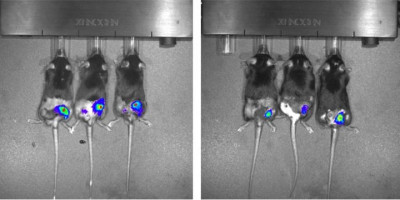
Each year, several thousand women in Germany die from ovarian cancer. In many cases, the disease is only detected when it is very advanced and metastases have already formed – usually in the intestines, abdomen or lymph nodes. At such a late stage, only 20 to 30 percent of all those affected survive the next five years. “Unfortunately, this situation has hardly changed at all over the past two decades,” says Professor Klaus Strebhardt, Director of the Department of Molecular Gynecology and Obstetrics at University Hospital Frankfurt.
96 percent of all ovarian cancer (high-grade) patients share the same clinical picture: The tumour suppressor gene p53 has mutated and is now non-functional. The gene contains the building instructions for an important protein that normally recognises damage in the genetic material (DNA) of each cell. It then prevents these abnormal cells from proliferating and activates repair mechanisms that rectify the damage. If this fails, it induces cell death. “In this way, p53 is very effective in preventing carcinogenesis,” explains Strebhardt. “But when it is mutated, this protective mechanism is eradicated.”
If a cell wants to produce a certain protein, it first makes a transcript of the gene containing the building instructions for it. Such transcripts are called mRNAs. In women with ovarian cancer, the p53 mRNAs are just as defective as the gene from which they were copied. “We produced an mRNA in the laboratory that contained the blueprint for a normal, non-mutated p53 protein,” says Dr Monika Raab from the Department of Molecular Gynecology and Obstetrics, who conducted many of the key experiments in the study. “We packed it into small lipid vesicles, known as liposomes, and then tested them first in cultures of various human cancer cell lines. The cells used the artificial mRNA to produce functional p53 protein.”
In the next step, the scientists cultivated ovarian tumours – organoids – from patient cells sourced by the team led by Professor Sven Becker, Director of the Women’s Clinic at University Hospital Frankfurt. After treatment with the artificial mRNA, the organoids shrank and began to die.
To test whether the artificial mRNA is also effective in organisms and can combat metastases in the abdomen, the researchers implanted human ovarian tumour cells into the ovaries of mice and injected the mRNA liposomes into the animals sometime later. The result was very convincing, says Strebhardt: “With the help of the artificial mRNA, cells in the animals treated produced large quantities of the functional p53 protein, and as a result both the tumours in the ovaries and the metastases disappeared almost completely.”
That the method was so successful is partly due to recent advances in mRNA technology: Normally, mRNA transcripts are very sensitive and degraded by cells within minutes. However, it is meanwhile possible to prevent this by specifically modifying the molecules. This extends their lifespan substantially, in this study to up to two weeks.
In addition, the chemical composition of the artificial mRNA is slightly different to that of its natural counterpart. This prevents the immune system from intervening after the molecule has been injected and from triggering inflammatory responses. In 2023, the Hungarian scientist Katalin Karikó and her American colleague Drew Weissman were awarded the Nobel Prize in Physiology or Medicine for this discovery. “Thanks to the development of mRNA vaccines such as those of BioNTech and Moderna, which went into action during the SARS-CoV-2 pandemic, we now also know how to make the molecules even more effective,” explains Strebhardt.
Strebhardt, Raab and Becker are now looking for partners to join the next step of the translational project: testing on patients with ovarian cancer. “What is crucial now is the question of whether we can implement the concept and the results in clinical reality and use our method to help cancer patients,” says Strebhardt. The latest results make him very optimistic that the tide could finally turn in the treatment of ovarian carcinomas. “p53 mRNA is not a normal therapeutic that targets a specific weak point in cancer cells. Instead, we are repairing a natural mechanism that the body normally uses very effectively to suppress carcinogenesis. This is a completely different quality of cancer therapy.”
Source: Goethe University Frankfurt